DJ Spinna holds the distinction of being a world-class record collector, DJ, and producer, known for his lifelong dedication to all three. He is as beloved for house music production as he is for his hip-hop work. His record collection is as coveted for holy grails as it is for Prince 12-inches. He can go toe-to-toe with the most avid 7-inch collectors and is as masterful with a rotary mixer as he is with a crossfader.
Spinna, born Vincent Williams in 1971 in Brooklyn to Panamanian-American parents, was exposed to music almost from birth. He taught himself to DJ as a pre-teen and started exploring production techniques at fifteen. In the 1990s, he gained recognition locally as a DJ and internationally as a producer for his work with Polyrhythm Addicts (alongside Mr. Complex, Shabaam Sahdeeq, and Tiye Phoenix), for example, as well as two albums and countless singles as one-half of duo Jigmastas, together with MC Kriminul, beginning in 1995.
His reputation in the dance music sphere also gained traction during this time, as his aesthetic in both fields can sometimes overlap, characterized by bouncy drums, Moog basslines, and eclectic samples. He’s since worked with everyone from Mos Def to Eminem, to late jazz guitarist Ronny Jordan. His remix range is even wider, reworking songs by De La Soul and Mary J. Blige, to Shirley Bassey, Sergio Mendes, and Michael Jackson—to name a few. He’s also contributed official remixes to back-catalog projects for imprints like Motown, Blue Note, and Verve, while also curating revered compilations for BBE and Harmless.
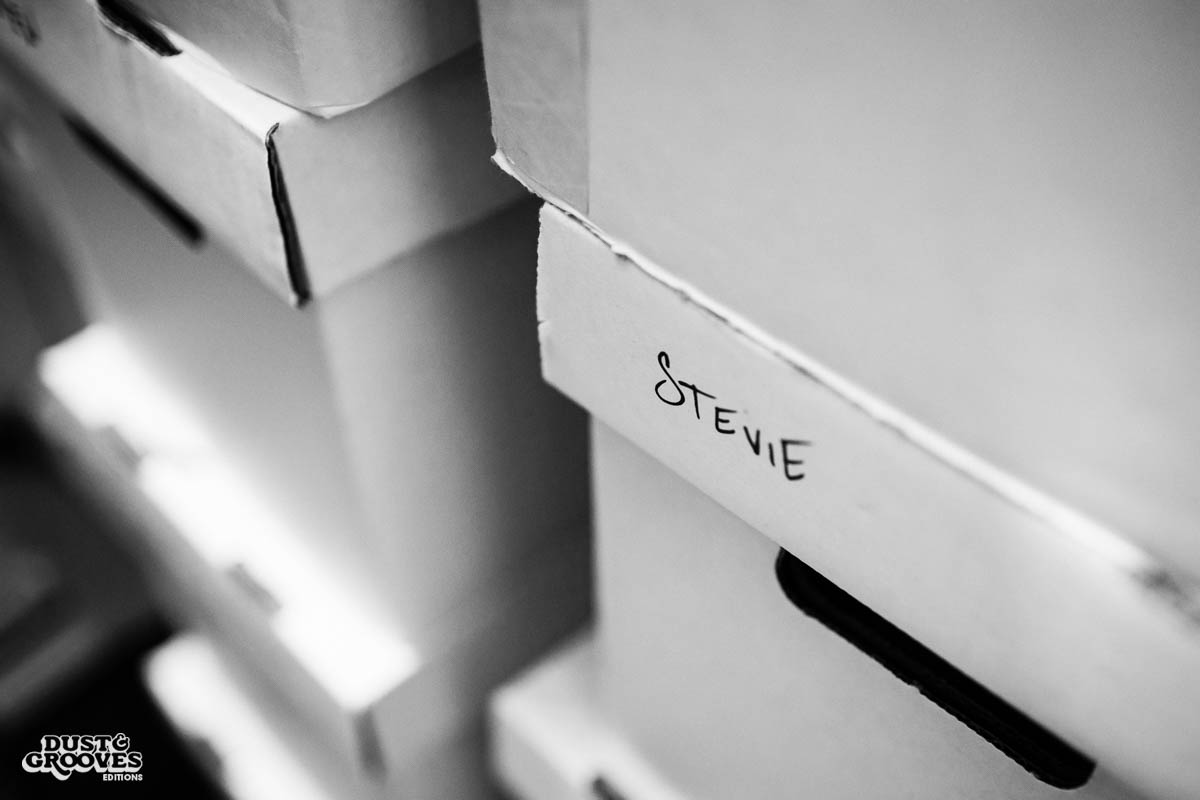
“A few of many 45 boxes. This one’s just Stevie Wonder 7-inches.”
Perhaps what has been spotlighted most recently are Spinna’s long-running themed parties, series celebrating the musical genius of Michael Jackson, Prince, and most notably, Stevie Wonder. The Stevie tribute parties, aptly called Wonder-Full, launched in NYC in 2001 in conjunction with co-founder and co-resident DJ, Bobbito Garcia. They soon gained and still maintain a cult following and have, on occasion, been graced by the appearance of Stevie Wonder himself. “He understands that I appreciate him,” says Spinna on his relationship with Stevie. “I think he appreciates me because I appreciate him.”
Spinna still lives and makes music in Brooklyn and is highly regarded by top record enthusiasts worldwide. After more than a few decades, he’s still at the top of his game, releasing new projects and touring all over the world at top-tier venues for an audience of music aficionados and devotees alike. We caught up with the NYC legend in his home studio for an extensive peek into his collection and the inner workings of his musical journey.
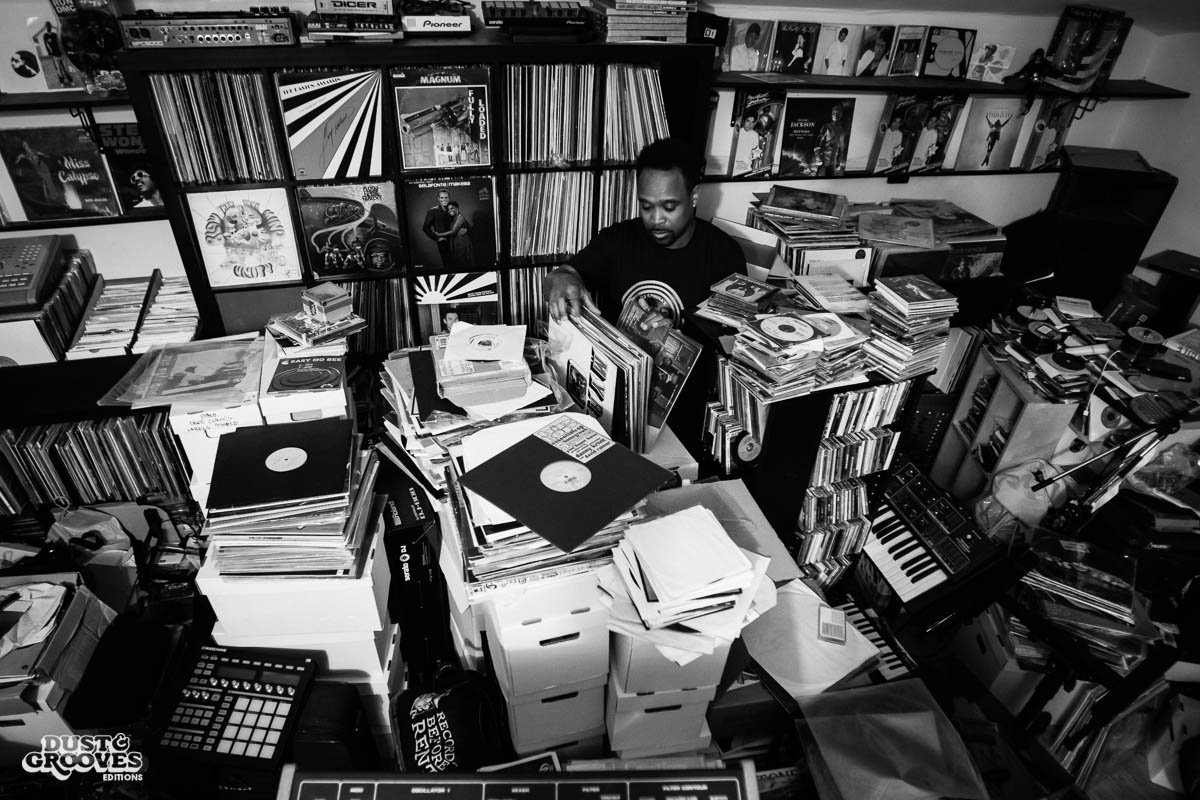
The Wonder-Full World of DJ Spinna
Did you have a stage name before Spinna?
I had a name before Spinna. You might even run into a record with my old name tagged on it. On my original “I Can’t Live Without My Radio” doubles, my name used to be DJ Dynomite. As a side note, I also used to tag “TNT” on my records, so there are records with “TNT” tagged on them.
When did you start DJing?
I started DJing in my bedroom and learning how to DJ in 1983. I was twelve years old.
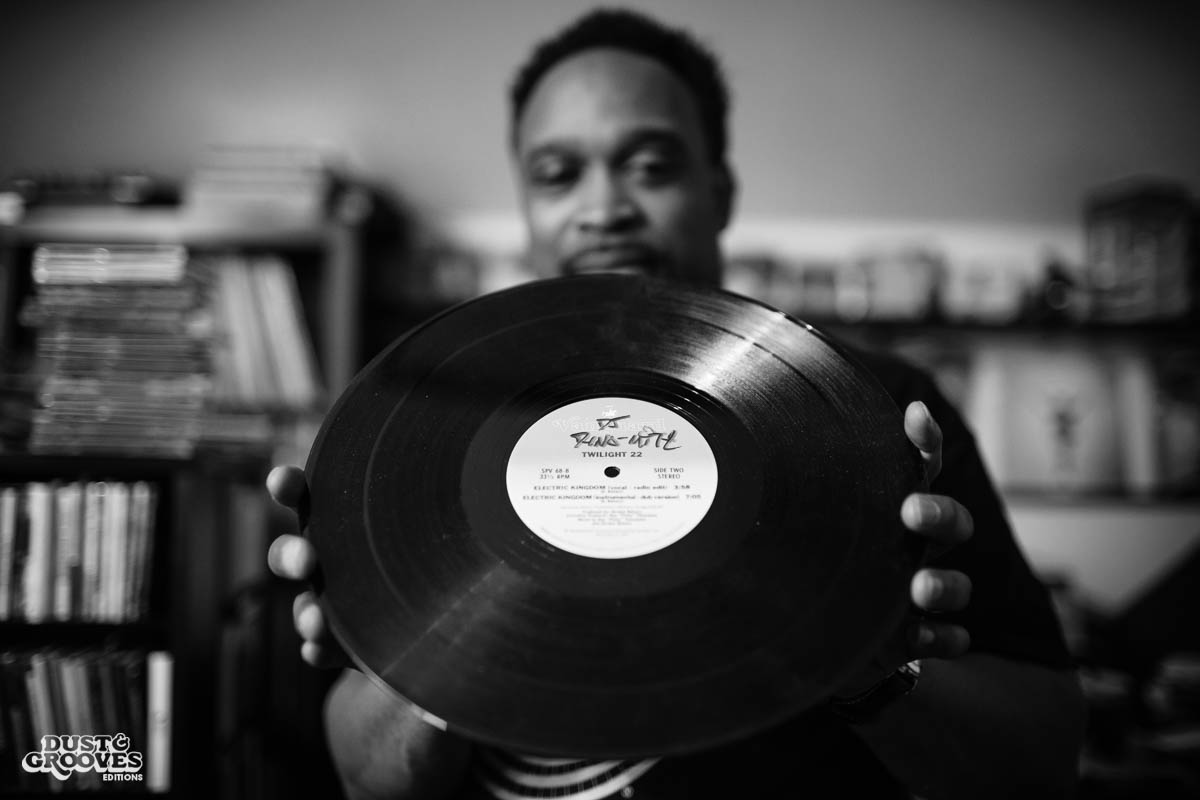
“One of my early DJ names.”
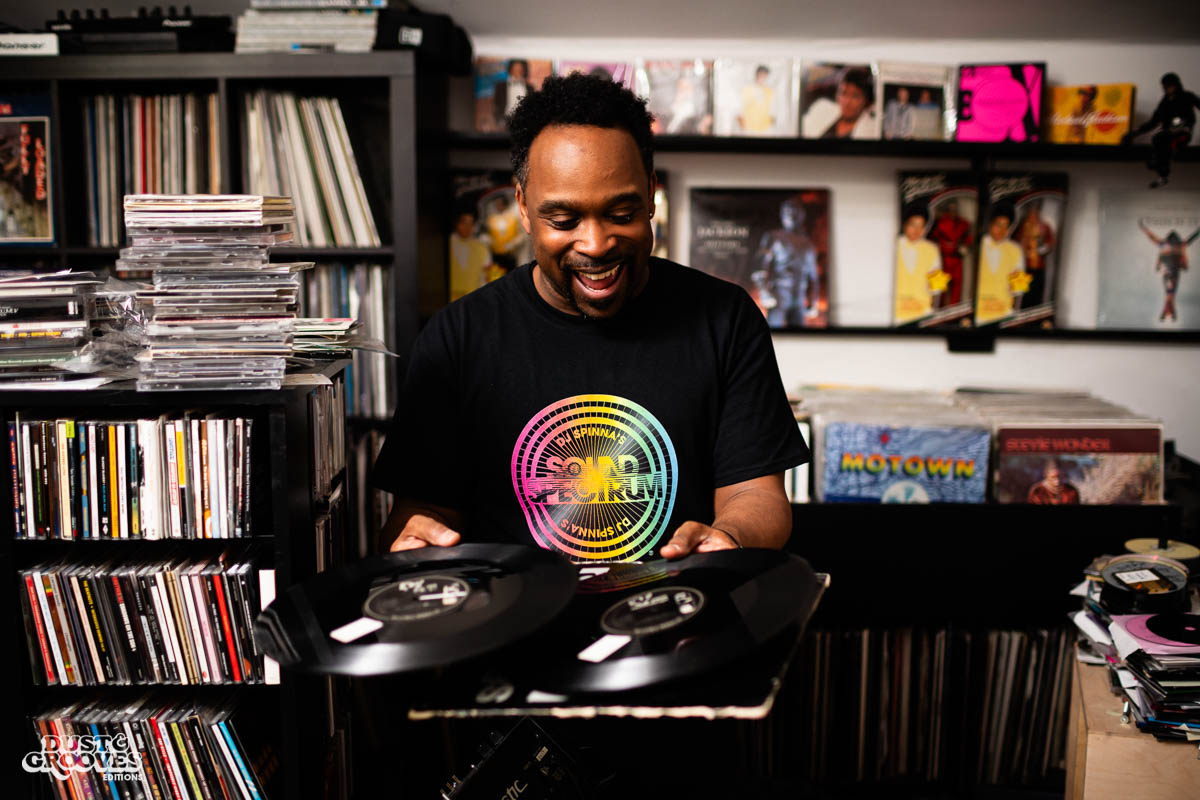
“I practiced a lot on this record after coming home from high school.”
Who were the first DJs you remember hearing?
There was a combination of people I had witnessed spinning at local parties, like birthday celebrations or basement parties. In particular, there was a mobile DJ crew called Salt and Pepper and they used to do many of the Panamanian boat rides I used to go on with my family. I remember being eight or nine years old and mesmerized by watching them spin. In Brooklyn in the 1970s, block parties were a big deal.
Another memory is that in the building next to mine, there was a DJ setup in the basement. A Puerto Rican brother and he used to mix live. To this day I wish I knew what his name was. I used to peer from the window and watch him do his thing. And then, the guys that inspired me that I would say I was closest to, were on my block. My friend Charles Moore, who would later get me into the Paradise Garage, had a crew called the Lazer Rock Crew or Lazer Rock Disco. They had a sound system, and they would set up on my block in Crown Heights and spin. Their speaker boxes were the shape of pyramids.
What other DJs have influenced you?
On the dance side, both as a kid learning and trying to figure out how to put records together, and blending and disco mixing and what have you, definitely Larry Levan, definitely Tony Humphries. And once I started going to clubs in the late 1980s and early 1990s, David Morales at the Red Zone, Timmy Regisford, Tony Humphries, and Louie Vega.
David Mancuso too. He does not mix, so I learned the power of the song the most from Mancuso. Having conversations with him, I realized that there’s a deeper integral part to musicianship and I gained more respect for recordings. He taught me that letting records play out is the way that musicians intended for the listener to hear the composition. I often see the power in that when I’m spinning, letting a song build up to its apex, which usually gets lost these days when DJs cut tracks off too soon. And of course, Grandmaster Flash, Jazzy Jay, Howie Tee, DJ Scratch, Jazzy Jeff, and Cash Money, are the main ones. And Jam Master Jay—as a show DJ, he was unbelievable.
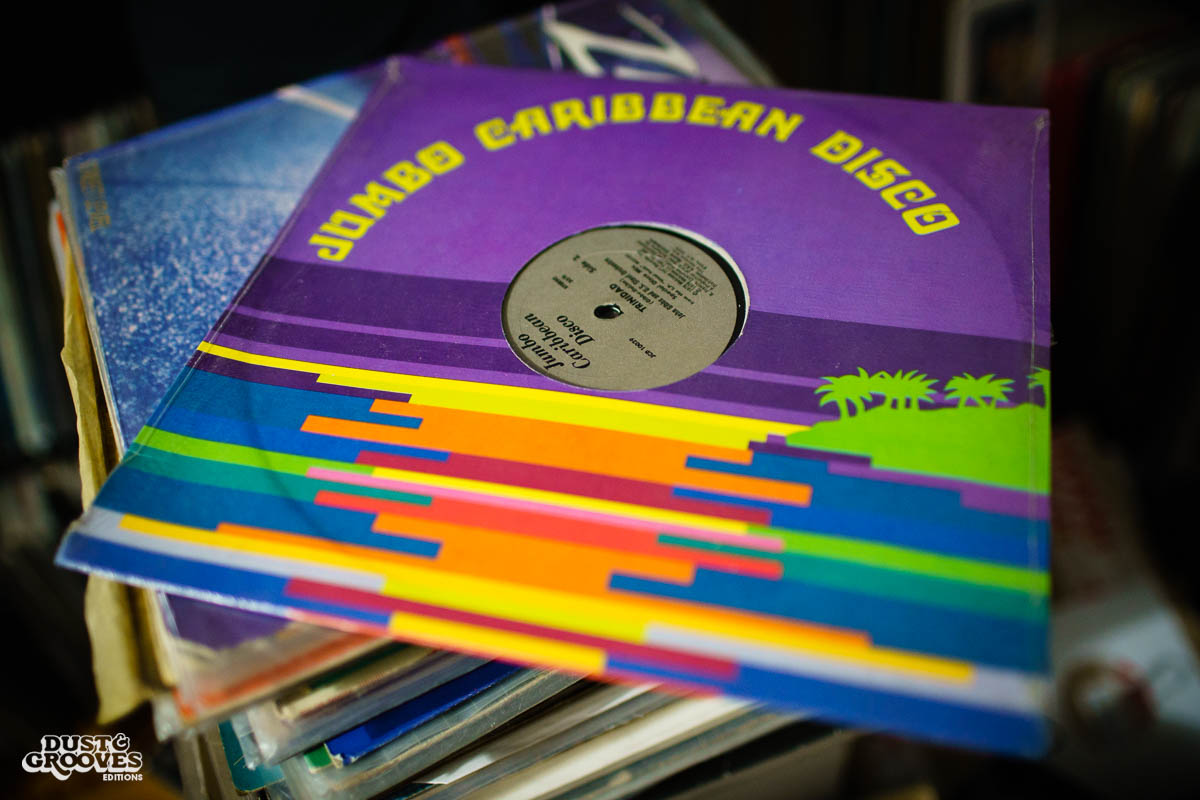
“This is a record that Mancuso used to play a lot. He put it on the map, basically. This copy is sealed!”
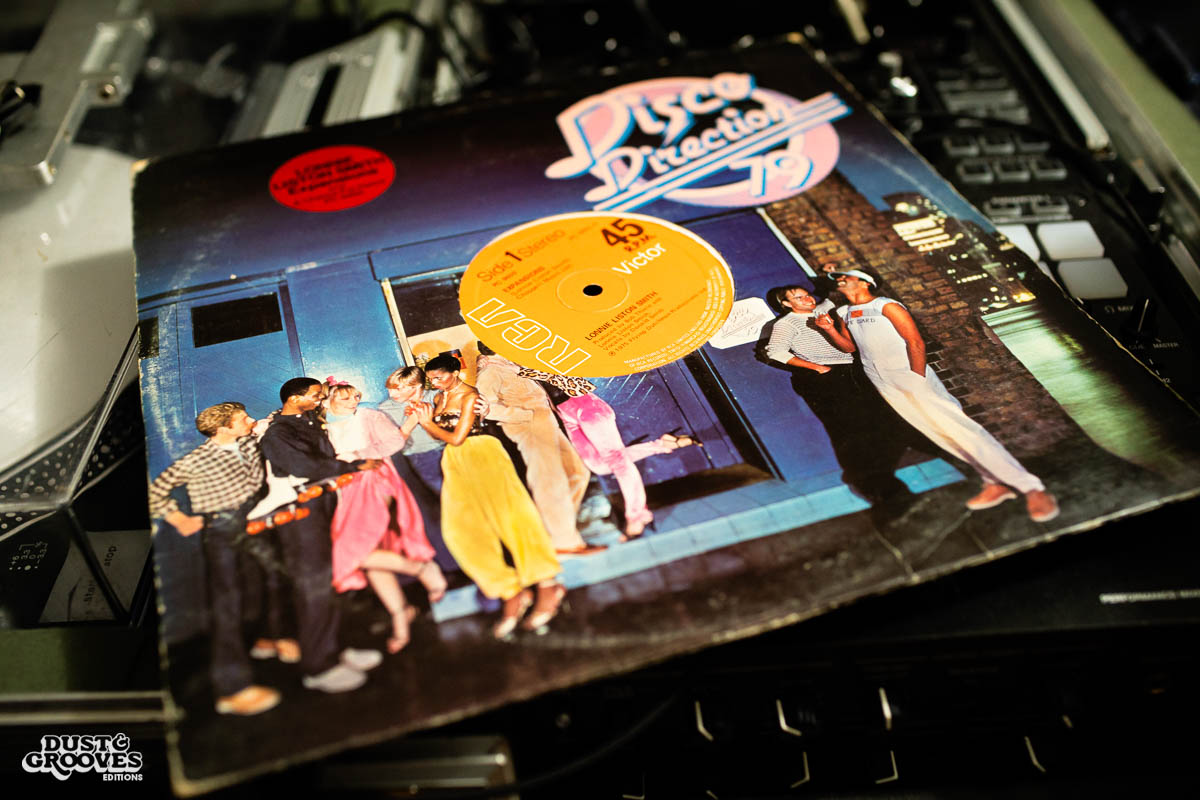
“I grew up on this song, but hearing it played by David Mancuso at the Loft put it into a greater context.”
So you play the whole song more often now?
It’s become trickier because everyone’s attention spans are short. But if you have a music appreciation and you let these records play, sometimes you see that the reaction that happens from elongated play could be ten times more magnified than flying through twenty records in ten minutes. I have a deep respect for Mancuso and I get why so many of the New York dance legends are who they are because they learned from going to his events.
How would you describe your philosophy when it comes to DJing?
I play by emotion. I play by energy, but it’s still calculated because I’m going with the room. I’m going with what the vibe is telling me and dictating me to play. That goes for not just Michael, Prince, and Stevie, but for every party I do.
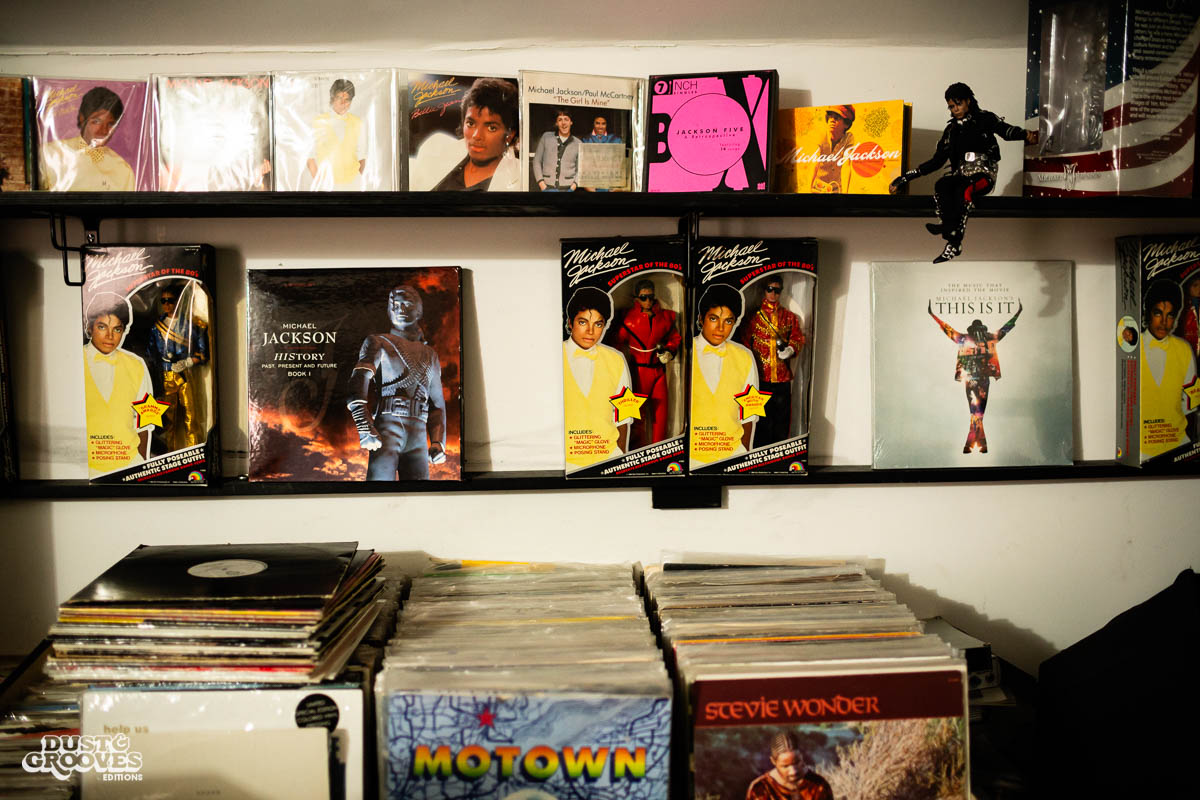
“RIP Michael Jackson. My first kiddie hero.”
Did you have a mentor at any point?
No one taught me how to DJ. I was totally self-taught. I just learned from watching and observing.
What about as a producer or collector?
Yeah, there was one brother who mentored me. His name was VLD, or Grandmaster Vic—he was a Puerto Rican brother and this was out in Coney Island. I used to spend a lot of time there. He educated me on house music but he was also an amazing scratch DJ. He helped me develop technical skills on the production side, too because he had a drum machine. He also had a lot of those early house records, and I used to make mixtapes at his crib with his records, which I would later find for myself. I got a lot of my education from him.
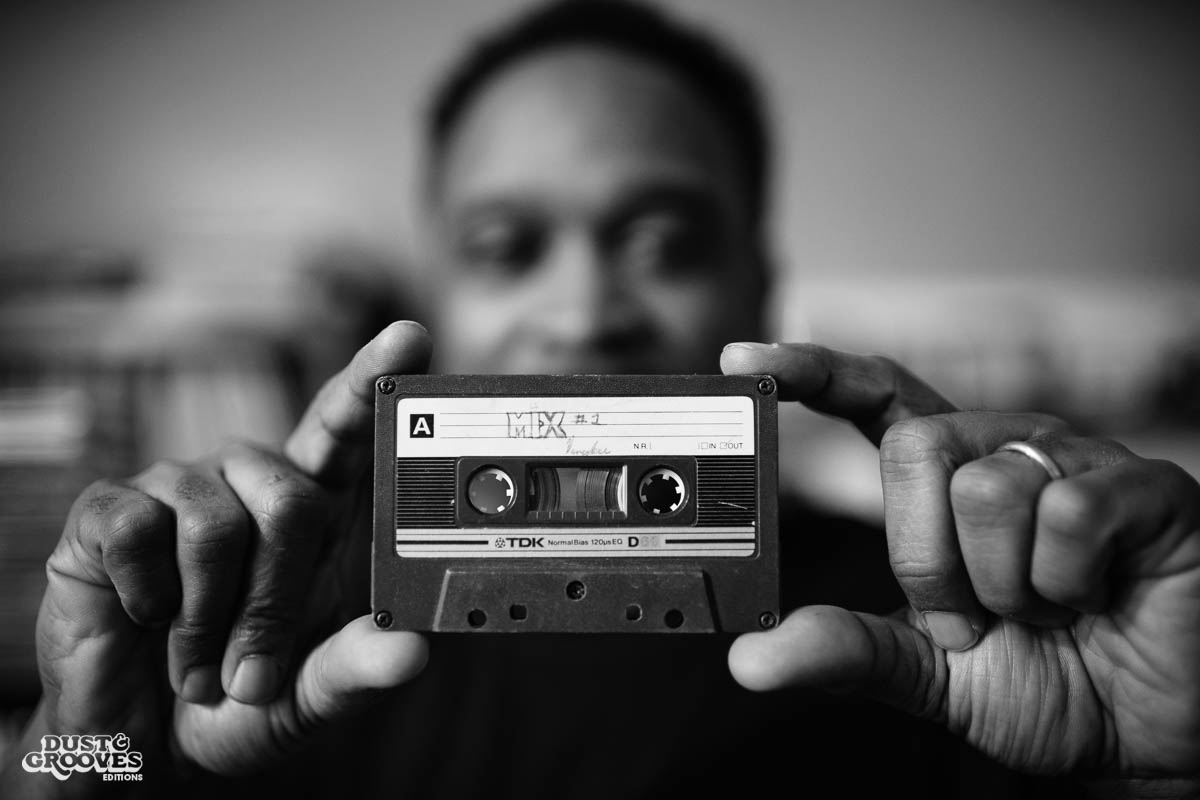
“First practice tape, ever. As Vinski.”
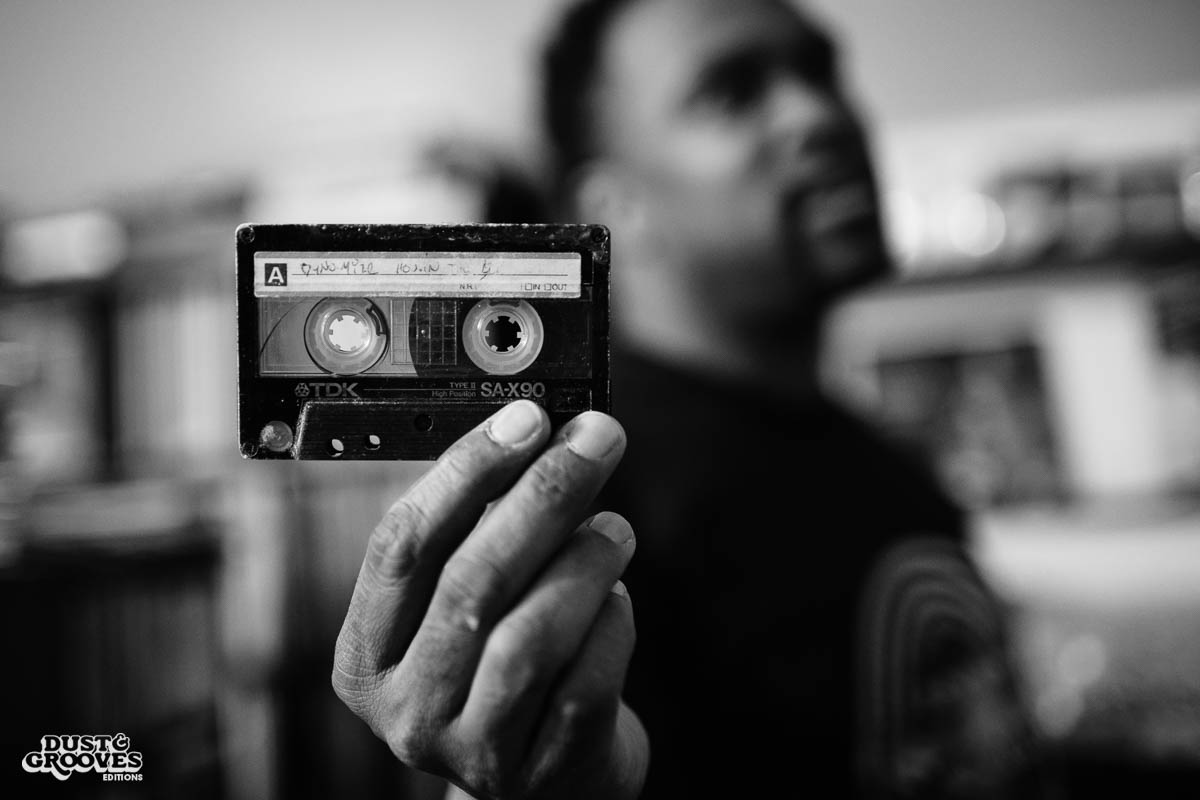
“First house mixtape. 1986. One side is better than the other!”
Also, my man Charles Moore, who lived on my block, had the sound system and was part of the Lazer Rock Crew. He stopped DJing and started throwing parties in the 1990s at the Bridge Street Loft. Downtown Brooklyn on Bridge Street. Around that time, he gave me the rest of his records, whatever he had left over from his block party days.
In terms of a record-digging mentor, Kenny Dope is hands down my record sensei. I learned a lot just from hanging out with him and going on digging trips. In 1998, we took a flight to Portland and stayed out there for a week just to buy records. His 45 collection is one of the best I’ve ever seen. Nobody has it all, and we’re all still learning, but that guy has a lot of records.
How many records do you have in your collection?
I think, in total, I should be at the 100,000 mark right now. Between 45s and big records, definitely. It’s been my whole life. I’ve been buying forever and still buying like crazy. People send me records too.
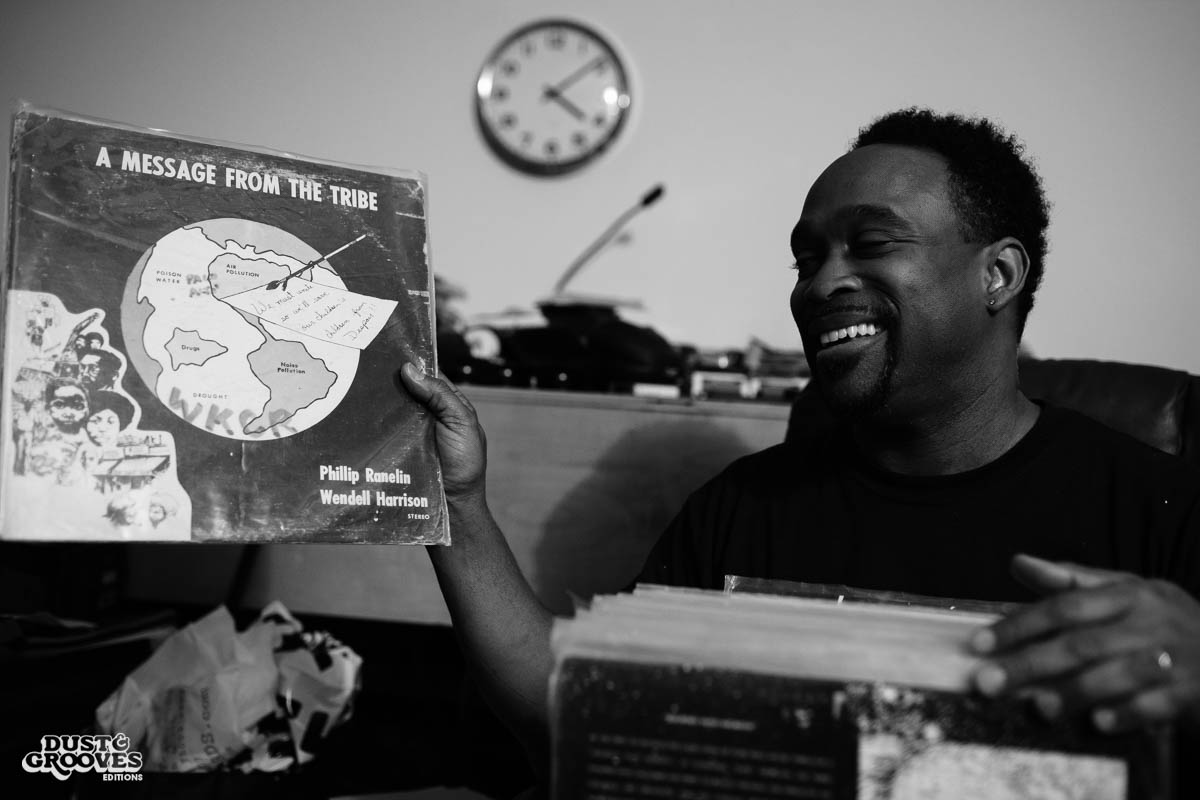
“This was given to me by an old roommate who had an amazing jazz collection.”
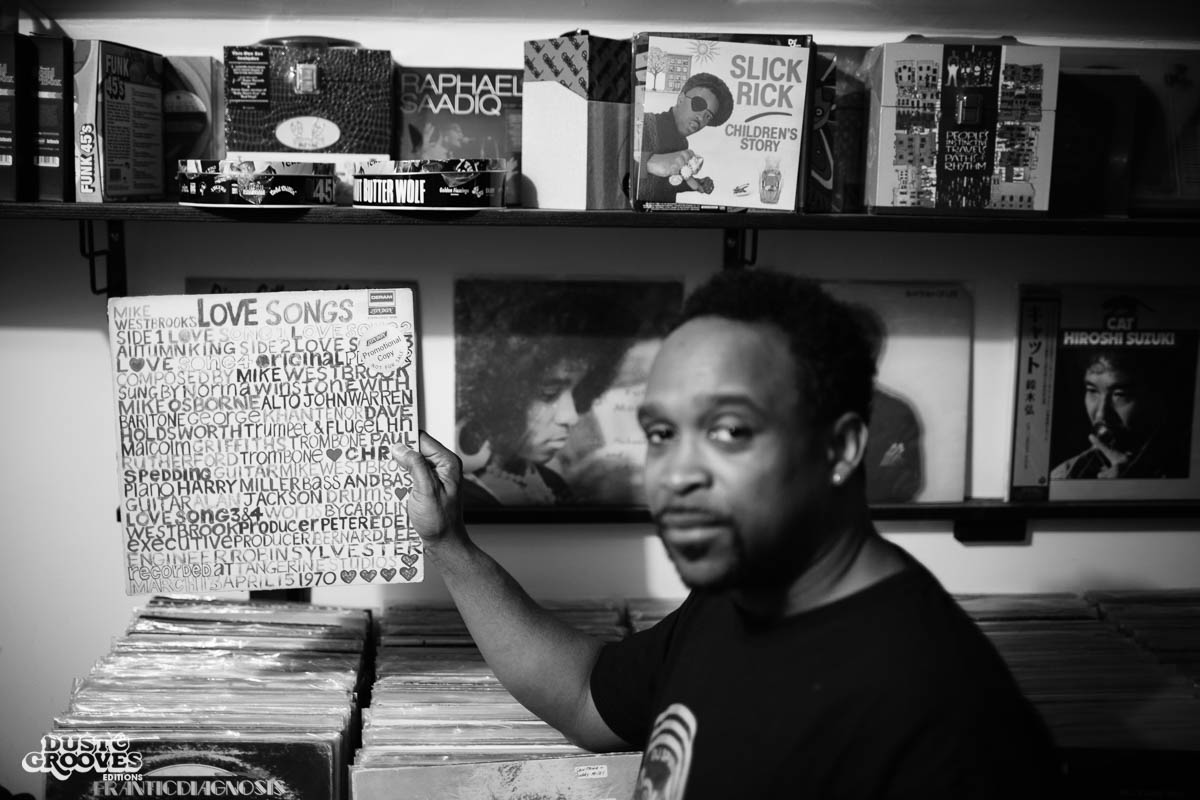
“An incredible jazz-rock record I got from a collector when he moved back to Japan.”
Have you noticed a difference in the culture of collecting records since you first started?
The biggest problem is digging online and dealers gouging with prices based on internet sales. I know some records should be five or ten dollars in value and those records can be jumped up to fifty or a hundred bucks because some tastemaker DJ blows it up. And there’s also a thing where there’s ten copies of this record on Discogs and they’re five bucks. There are dealers out there that will buy every single copy to make sure that there’s none left so that the value goes up and you could only get that record from them.
I also remember when deep funk was the thing in the 1990s. Now a lot of people have sold those records off. They’re over it because they want to move on to the next thing. And they started getting into modern funk or modern soul. And then that will die, and then house will be the next thing. Actually, house is starting to pick up as a collectible genre. So some of these records that I revered and played back in the day are starting to dry up now.
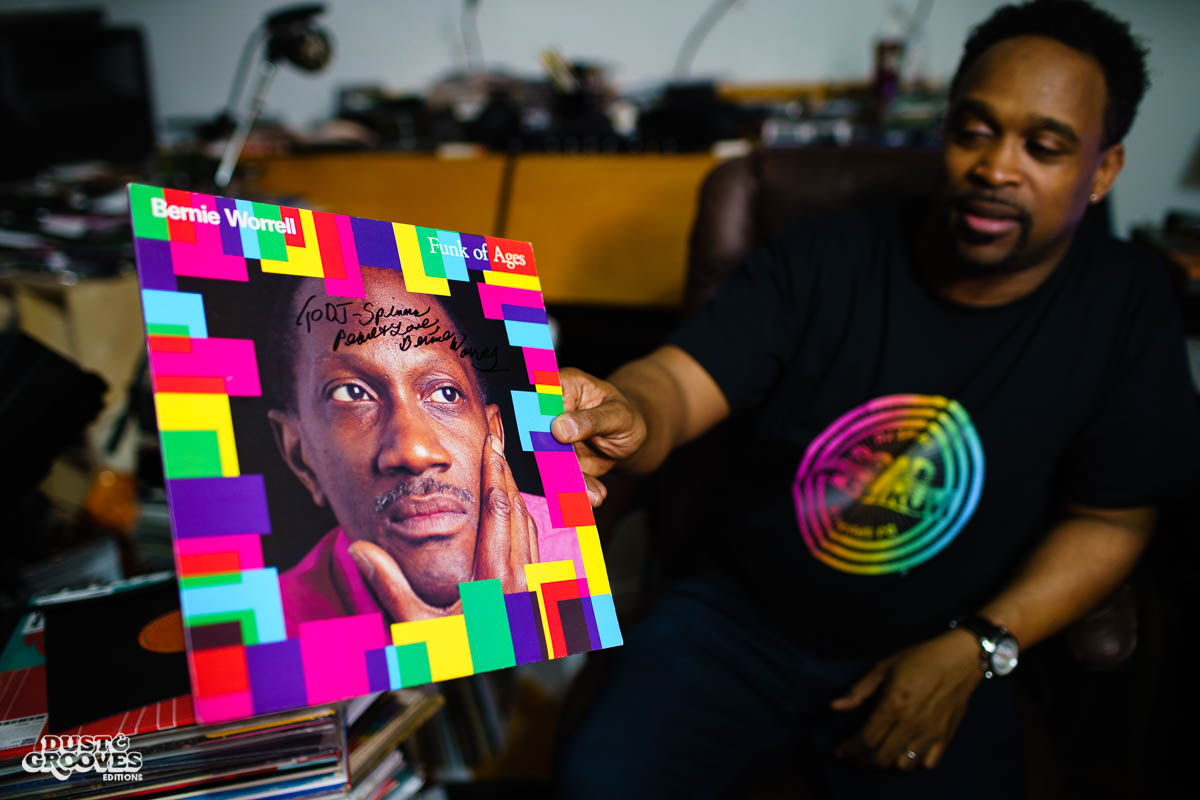
“When I saw that Volunteered Slavery was on it, I felt compelled to buy it to see what he did to it.”
…when I first started getting into digging we were looking for James Brown records, looking for Kool & The Gang and The Meters. A lot of our parents may have listened to them but we wanted them for ourselves. And some of those titles were actually rare. Everything goes in cycles.
Is it the newer generation of collectors who are changing things?
My frustration comes more with the experienced diggers. To me, some of them are phony. I can’t ridicule the newcomers. They like what they like. Some may need guidance but some of them are really just true music heads and they want to learn. But they also shouldn’t get got, either, and learn the ways of getting records that won’t kill them. The internet has become a very convenient place. But going out in the field and finding a gem for cheap is always so rewarding. Not all of us have the time to dedicate to that, but that’s always going to be the best way to get the hard stuff.
Some younger collectors might not even realize that these records on Discogs would be cheaper if they found them at a shop somewhere.
Right. And we’re fortunate in New York to have so many stores. In some parts of the country and the world, there are hardly any stores to find these things and the internet is a great place to find them quickly.
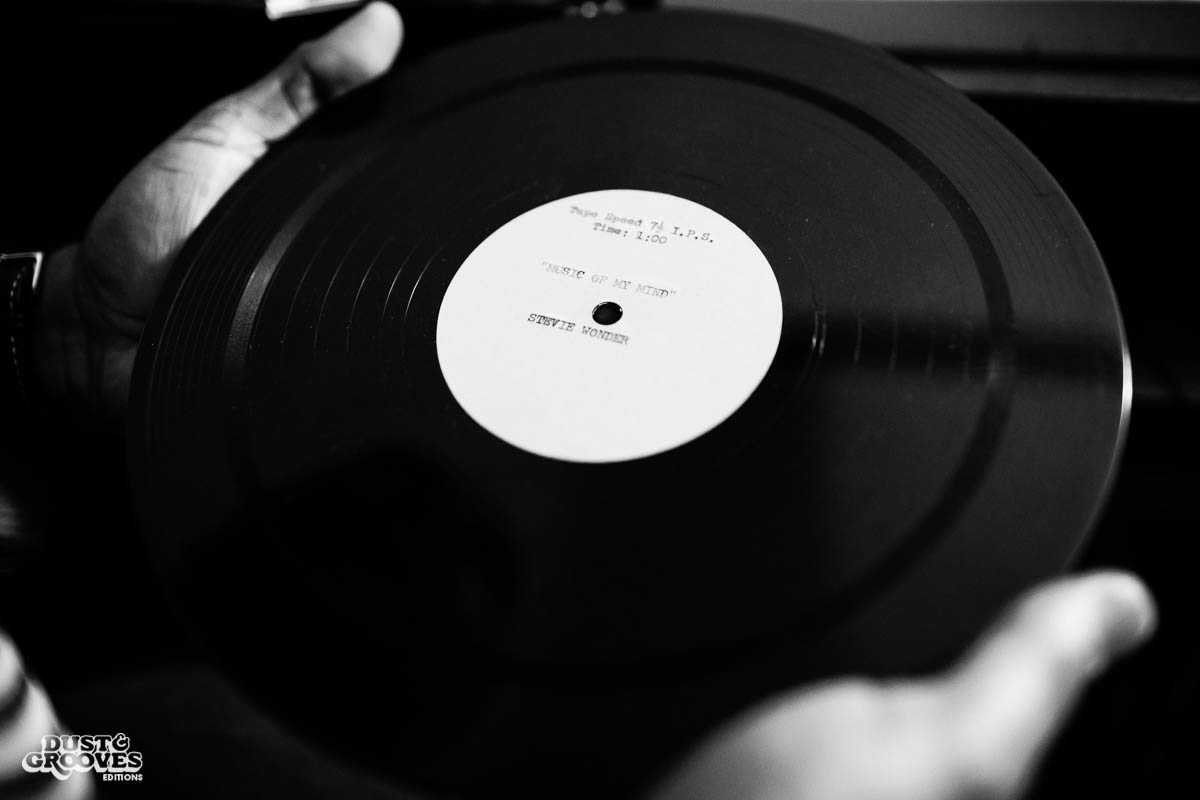
Radio ad for Stevie Wonder’s Music Of My Mind (Voiceover) “If you enjoyed the talents of Little Stevie Wonder, now’s your chance to hear the full-sized version.” “I found this on eBay back when it was just starting and had no idea what was on it until I got it. But because it was an acetate and a commercial, I felt it should be mine.”
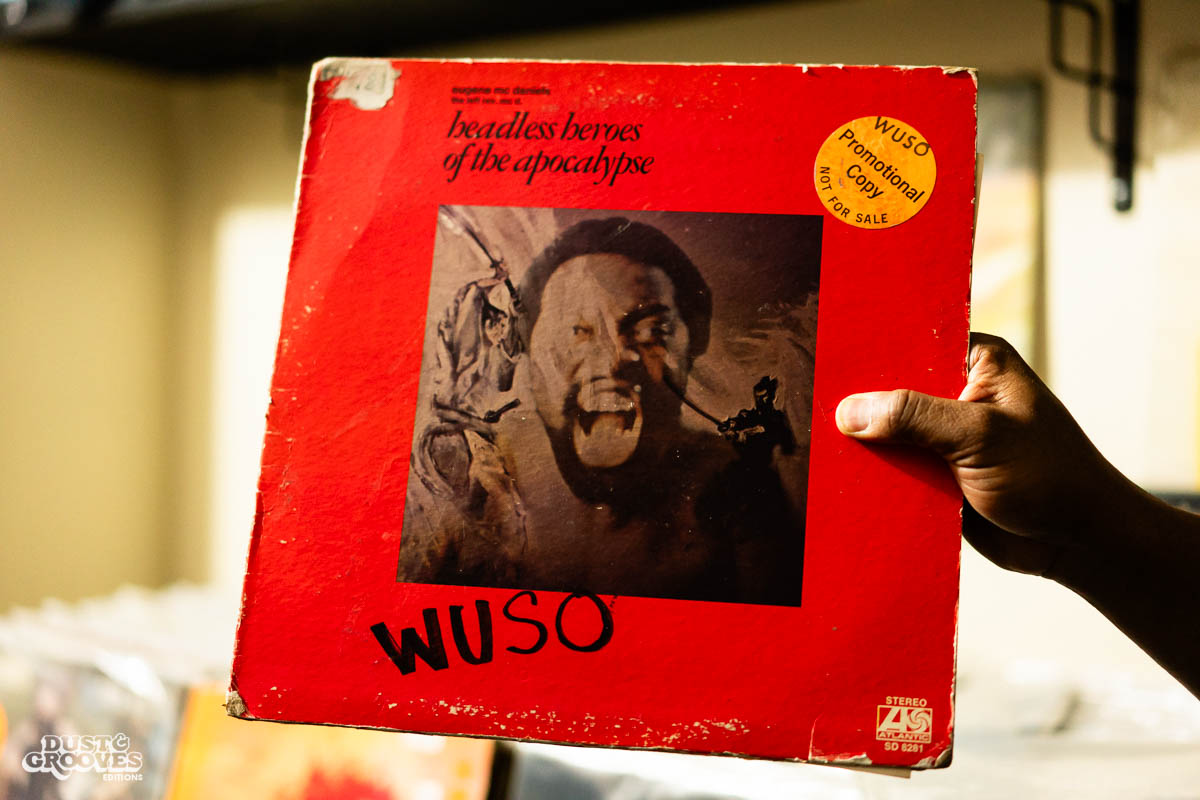
Eugene McDaniels – Headless Heroes of the Apocalypse “He wrote ‘Feel Like Making Love’ for Roberta Flack. Powerful songwriter. I caught this for $4 in Binghamton.”
Do you remember the first time that you spent a lot of money on a record?
The first expensive record for me was S.O.U.L. This was right after Pete Rock and CL Smooth used it. It was $45. At that point, I wasn’t spending a lot of money on anything, record-wise.
Is that a philosophy, not to spend too much money?
No! That’s out the window! I do it a lot less now because I have adult responsibilities but yeah, I still spend. One of those records we listened to earlier was a hundred bucks.
Is there a number in your head where you draw the line? What is your threshold when you walk into a record shop?
Yes. I’d say $1500 is my cap.
That’s a pretty high cap. When are you willing to spend that much on a record?
Even with $1500, I prefer it to be paid in installments, or part cash, or part trade. If I can avoid dropping an entire $1500 in one shot, I will. I know a couple of people that would do that but I’d rather not. Unless I want it that bad. I really can’t go higher than that. Plus, the record has to be good, and the condition must be mint. I have to feel like I’m never going to see it again. I can’t say that I’ve done that very often. But there are records I bought in the past when I didn’t spend that much that are worth a lot now, like the Stark Reality. That’s a $1300 to $1500 record right now, depending on where you get it. I think I paid like $300 or $400 for it when I got it.
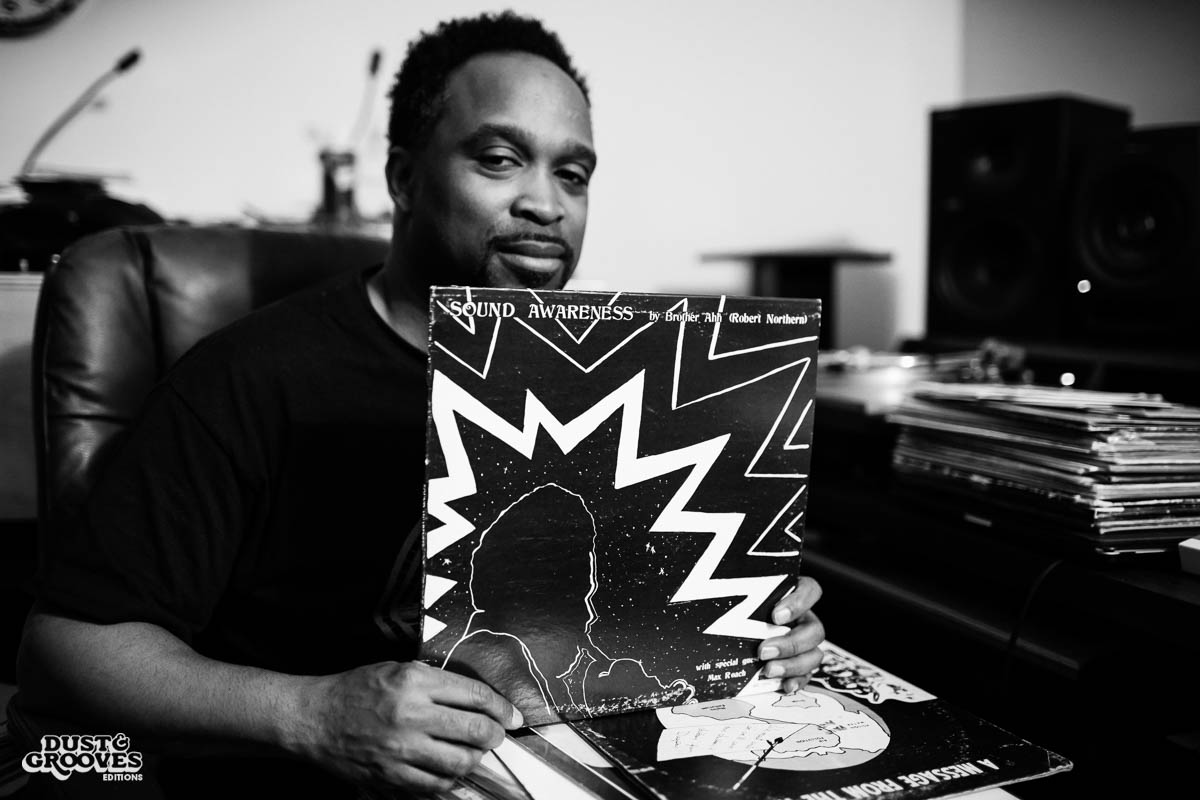
Brother Ahh – Sound Awareness
“A Strata East record that took me a long time to find in good condition. I’m almost done with my Strata East want list.”
When I was walking up the ramp, “Ten Percent” by Double Exposure was playing. Those are the memories I have. And when I was leaving the club, getting on the train, it was daylight. Definitely my first experience leaving a party in daylight, on a Sunday afternoon. And riding on the train home, my ears were shot to death. I couldn’t hear anything.
At what point did you start making beats?
The first time I ever went into a recording studio and made a beat was in 1985. I was part of several hip-hop groups growing up. Trying to get on, trying to get a record deal, and making demos. I was even rapping at one point.
Do you remember the first records you sampled?
I was making beats before sampling. When it comes down to sampling, you’re talking early 1990s, like 1990 or 91. I think one is Cannonball Adderley, Love, Sex, And The Zodiac. You know what’s crazy? I sampled a lot of records early that people wound up sampling later on, making more noise and bigger records. I always felt like I was ahead.
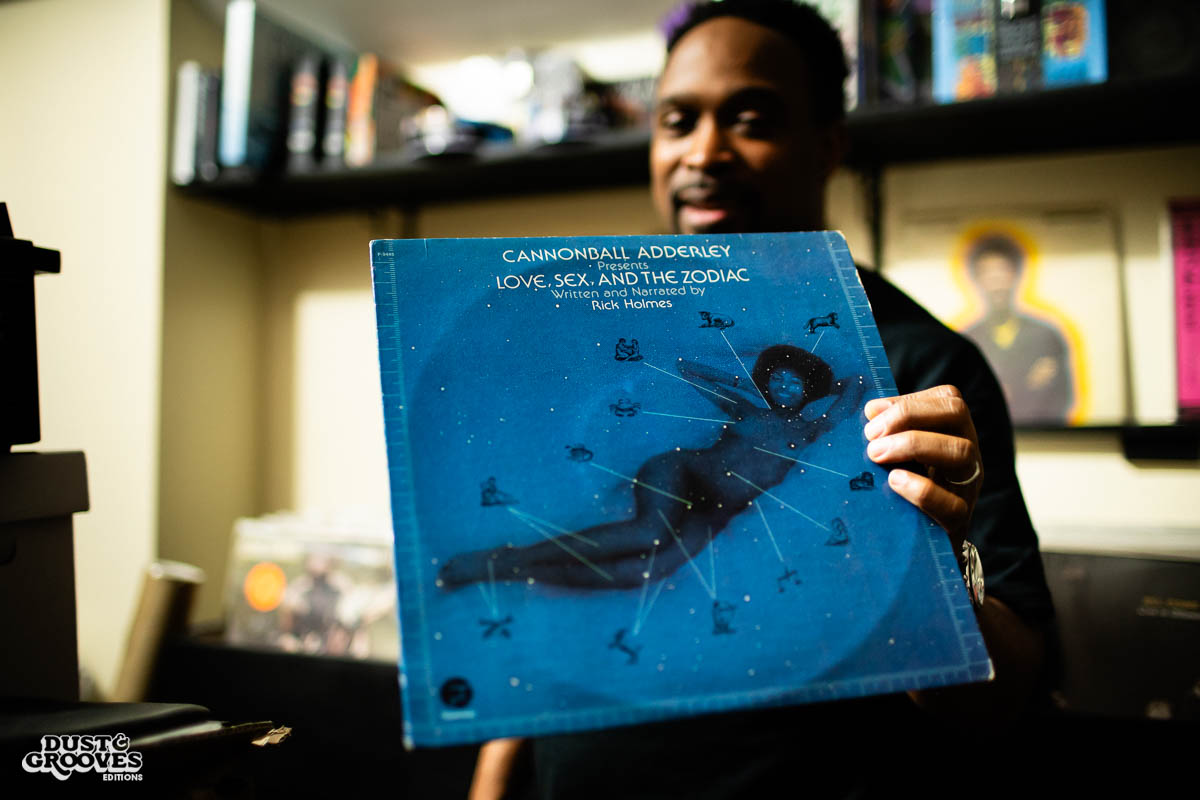
“Jigmastas recorded a demo to this called the “Wickedness of Jiggyness,” but we never put this out. And I’m rhyming on it.”
Was it a seamless transition or was there a moment when you realized that you weren’t just buying records to rock parties but that you were actively collecting?
That’s a good question. My dad had great records, and my uncle had a pretty dope record collection too, which I now have. I learned a lot about music from his collection. My dad had some, but my uncle’s was way bigger. A lot of soul, disco, funk, and Caribbean music I grew up on. I used to play his records at family gatherings like birthday parties, Thanksgiving, or Christmas. I would be the five-year-old kid playing his records. I used to take them. He used to get mad at me when I would sneak records out of the house. So I would say I’ve been collecting records all my life.
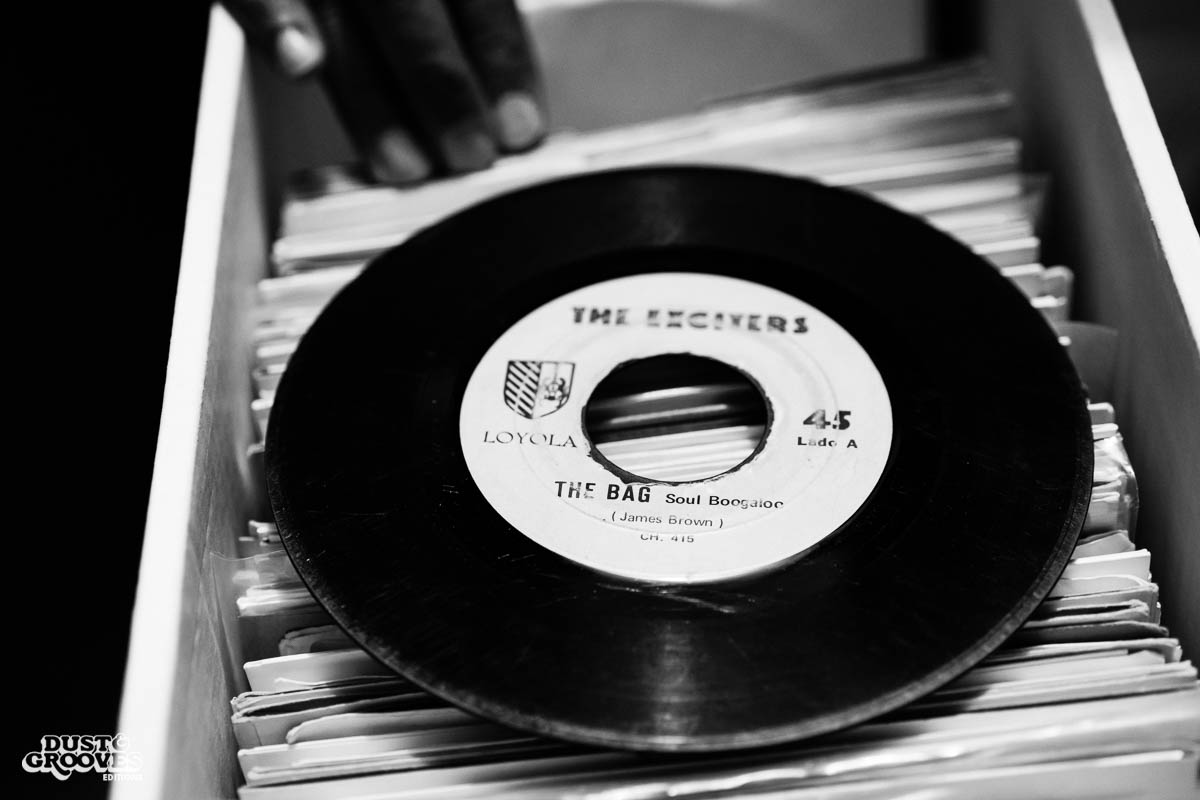
Cover version of “Papa’s Got A Brand New Bag” by the Panamanian band The Exciters. I grew up on this one. Straight out of my dad’s collection.
How would you say your tastes have matured through the years?
Records I definitely wouldn’t have been checking for in the early 1990s, I love them now. My dad had so much northern soul stuff that got ruined so he got rid of them over the years. I wish I had them now because there were probably a lot of gems in that collection. I just didn’t care about it back in those days because I was more focused on DJing and sampling. That was the main thing. But I think the maturity level for buying music started getting much more intense by the mid-1990s. Even in hip-hop, even though I stopped rhyming, I was working with Krim and a whole bunch of underground MCs.
What do you think about hip-hop nowadays?
Well, let’s just say that a lot of what comes out now is not true to the origins of hip-hop. Hip-hop has to evolve, yes. The music that came out in the 1990s was an evolution from music that came out in 1983/84, or even 1980. It keeps evolving. But sometimes I feel like it’s headed for the shithole. So, if a younger audience can appreciate music from a time when we were still trying to keep it true to the essence, then I think that’s a good thing for the culture, for the art form, for the genre. Bring things back full circle, hopefully. There’s always been good hip-hop records being made, but a lot of it has gotten pushed under the radar.
What do you listen to or collect that you think would surprise people? Not necessarily stuff that you play out but just stuff that you buy to listen to.
I got a lot of hard rock. New Wave is not out of the ordinary. Folk is probably the closest thing to something people probably wouldn’t think of. I just bought a dope folk reissue the other day. But there are elements of soul in it too. There’s weird stuff in my collection. Children’s records, like Sesame Street stuff. Ambient music. Music that has no beats at all. You know Bruce Haack? These are experimental electronic kids’ records from 1969. I don’t know of too many people that are after them.
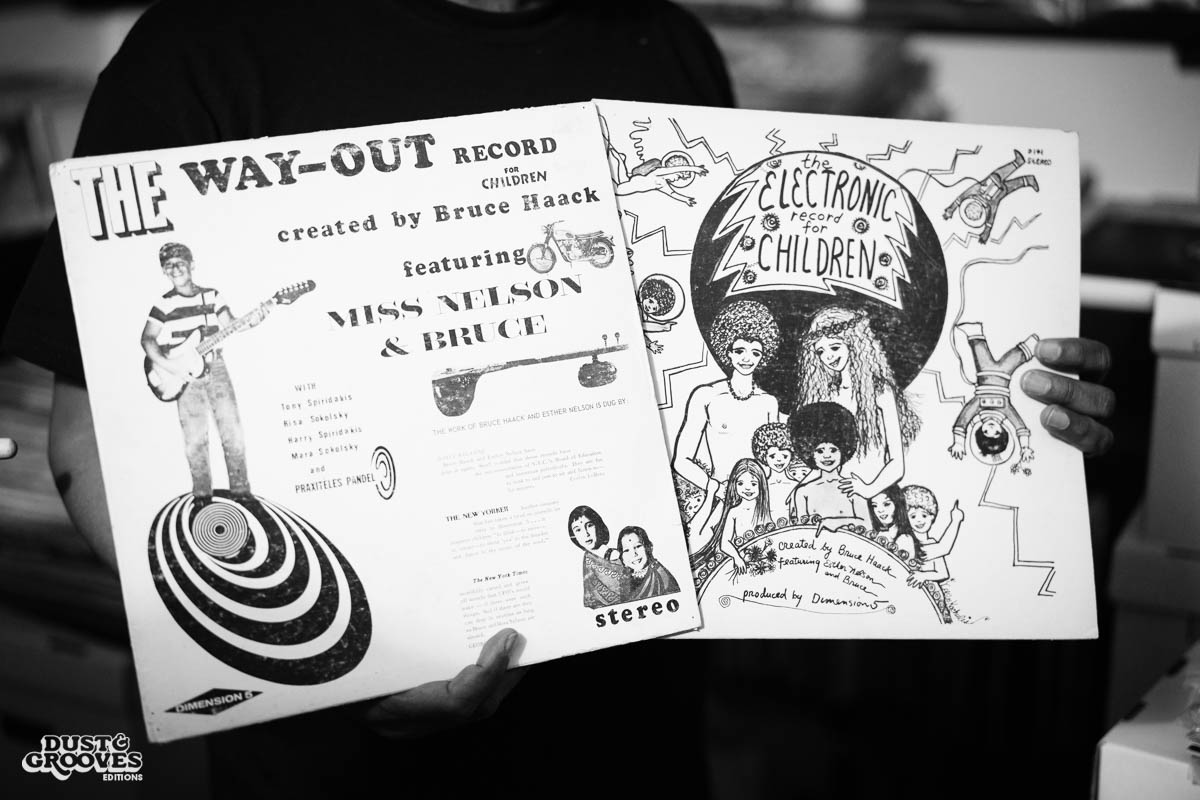
“I love experimental electronic records. The weirder, the better.”
These look like they would have crazy samples on them.
He made later albums that had some sounds on them that Dilla sampled. These are the earlier ones. They’re narrated. I wouldn’t want my kids listening to them, though. If I was a kid listening to this, I would be spooked out. I think people are going to think I’m crazy.
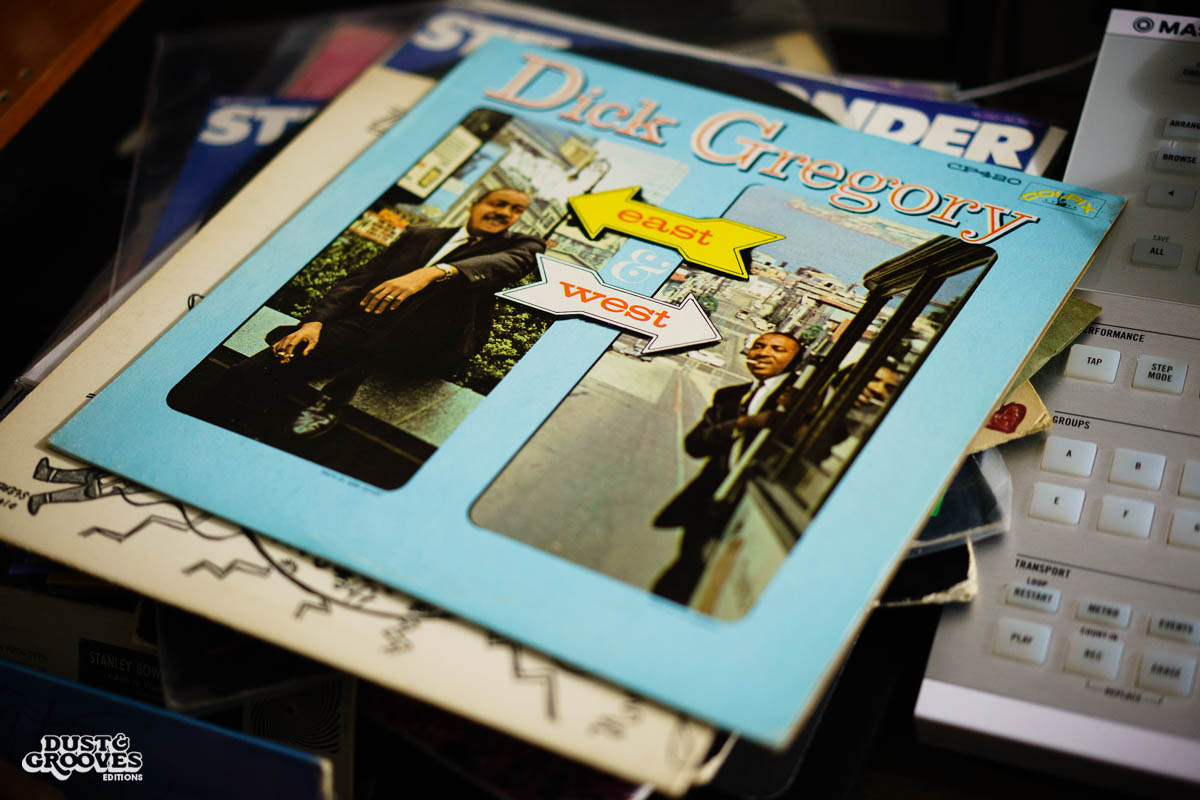
Dick Gregory – East & West
“I also collect comedy albums. I found this in the street from a record vendor. Dick Gregory had just passed away and I was intrigued by this record because I had never seen it before and he’s very young.”
Do you collect anything other than records or music?
At one point, I was into collecting TV shows, 1970s blaxploitation films, and posters. But I have a mortgage. I have bills. And I wanted too many records, so I had to focus. I was into sneakers too at one point. But it was not as important as vinyl or music.
Do you think of yourself more as a DJ or producer these days?
It seems nowadays like DJing is taking more precedence in my identity because so many people have heard me play that don’t know that I make records. Or they may discover it later. But I think I’m in people’s faces a lot more than I’m in people’s ears. Not by choice, and I would like to change that. But I’m a DJ first, and “DJ” is part of my name as well, so people do know me more as a DJ—and rightfully so. That’s my identity.
Was there a time when you felt you had a different primary identity?
I would say so. When I first got home from college, I made up my mind that I would never work for anyone. And I went hard on producing and making my name known in the music industry. Underground hip-hop was such a big deal when I got in and I was so connected with artists, labels, and my group that it seemed practical for me to build a producer name that way. I also wasn’t DJing as much.
The only people that knew me as a DJ were from school or my crew. And later I would say people knew me as a hip-hop DJ more than anything. But when you think about the masses, they knew me through records, so once I started traveling, I started going to Europe, going to Japan, and expanding the musical palette beyond hip-hop, and I think that’s when things started to shift.
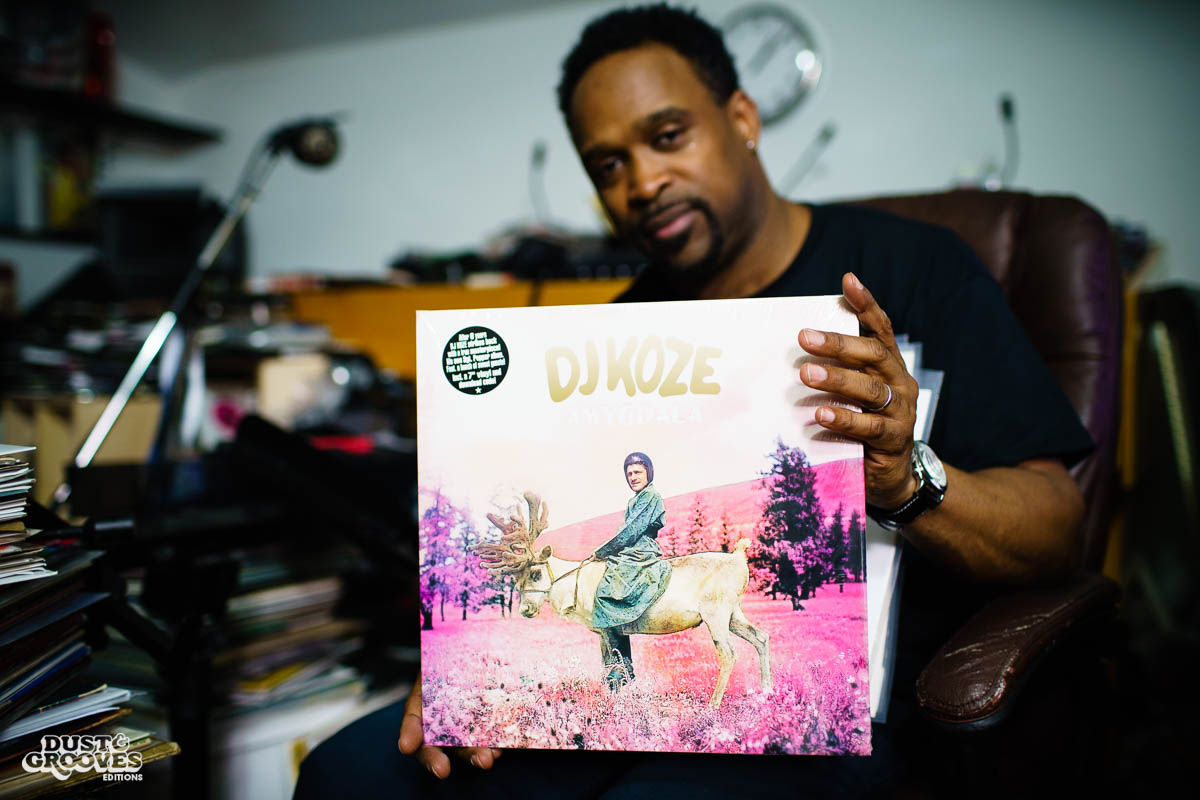
“I picked this up at HHV in Berlin.”
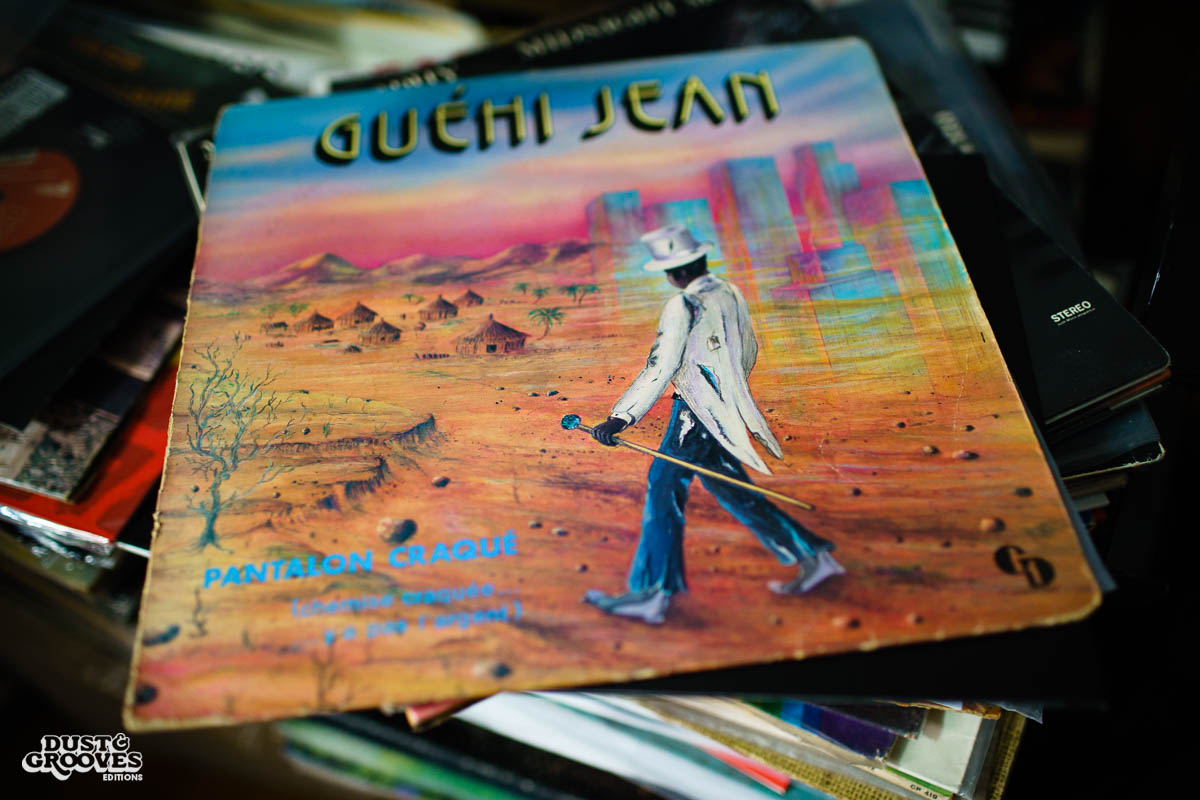
“Something I picked up at Superfly Records in Paris. ‘80s Afro-Disco. Heavy.”
Another part of your legacy are the theme parties, specifically the Wonder-Full events. How did you end up connecting with Stevie Wonder?
It’s because I paid homage to him in a sincere way for almost twenty years. I also think I caught his attention at a time when he was quite dormant. He wasn’t doing a lot of shows. There were no records out. At the time that we started the Wonder-Full party in 2001, his last studio album had been released in 1995. It was good timing and in New York, he hadn’t been doing any shows.
More importantly, I think once he got to meet me and once he got to experience the party, he realized that I’d kept his name alive for a while. Not to say that people forgot about him or anything, but I’ve kept his legacy afloat, spreading his music and message globally whenever he physically couldn’t. I always see myself and this party as a conduit for what he’s already done.
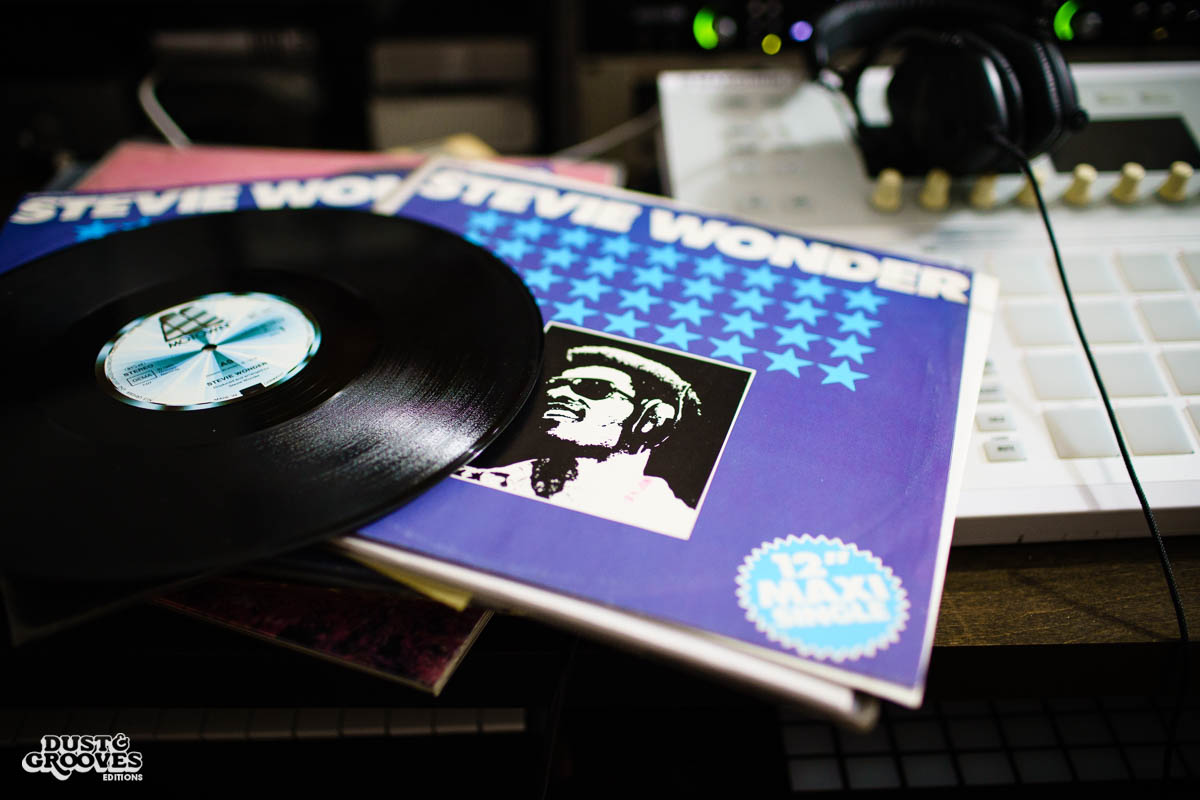
“I consider this one of my prized 12-inches. It’s the only legit way to get “As” on a 12-inch single.”
How would you describe your relationship with Stevie today?
I honestly can say he likes me as a person. We’re at a point now where we tell each other we love each other on the phone when we speak or when we’re in person. I think that carries a lot of weight. If I was a dick or an idiot, I probably wouldn’t even be able to continue the party. But he’s gotten to know me as a person. And he’s big on energy. Even if I didn’t say much in his presence, he can pick up on people’s energies. I can say that I’ve been blessed and I rally for him. I support him, and I support his music, but in other ways, I’ve put out some fires that he’s not even aware of. So it just came full circle.
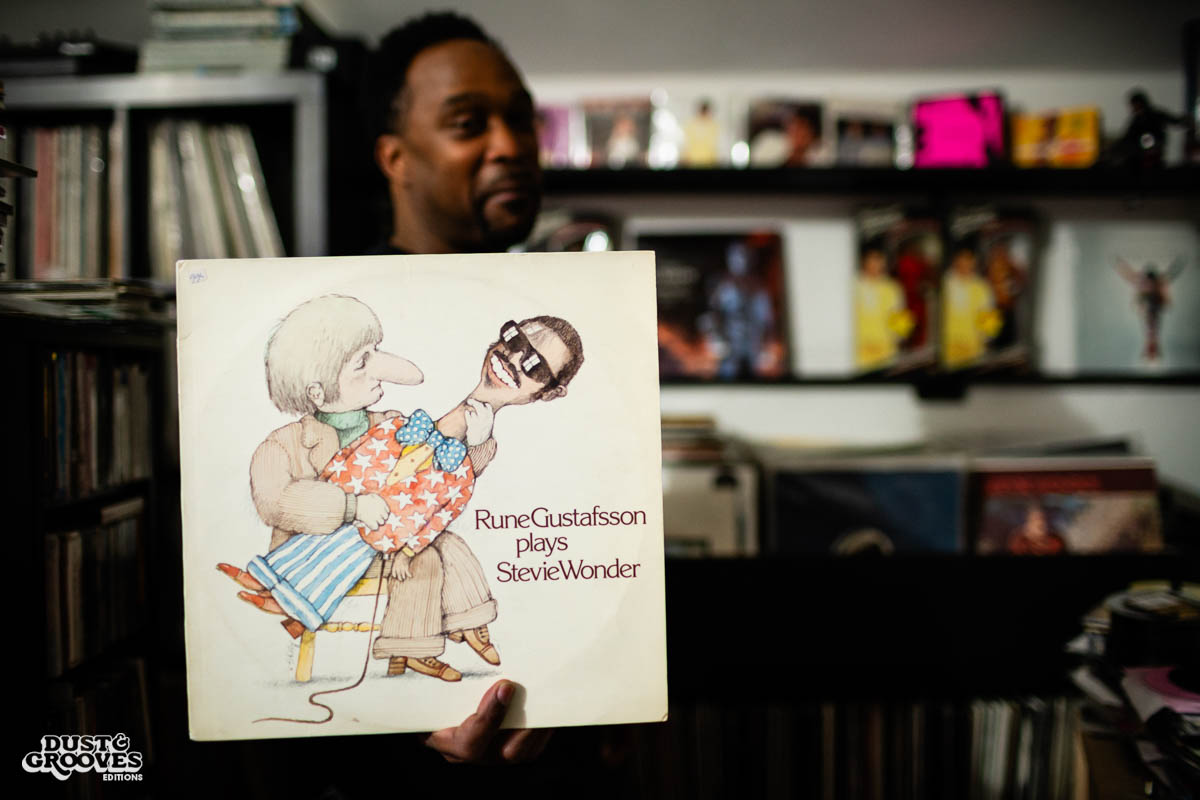
Rune Gustafsson – Plays Stevie Wonder “I picked this record up for the cover. It’s a jazz record with interpretations of Stevie Wonder. The jacket is actually a little spooky if you think about it…”
Looking back at your career, what about it makes you the perfect conduit for his music?
One thing he told me was that he appreciates the fact that I celebrate him and I celebrate Michael and Prince the way that I do. He said that I’m fearless. What he means by that is in today’s musical climate, with what people’s expectations are from DJs and parties and social gatherings, it’s quite unusual to have a party that’s a Stevie Wonder event.
His catalog is not party-rocking music. He may have a few records that work well at a party, like the “Do I Do” or “Another Star,” but it’s difficult to weave his entire catalog into a musical tapestry that tells a story and entertains people. People can experience the true essence of Stevie Wonder. I think for me too, it does take a lot of courage and thought to do something like that. It’s not easy. A lot of people have tried to copy it but they don’t understand the dynamics of doing a party like that.
There’s a lot of work that goes into it beforehand and while the party is happening. If you drop “My Cherie Amour” at peak time and it comes off, there’s a reason why it comes off. It’s the time that I played the record that made it work. Everything is calculated.
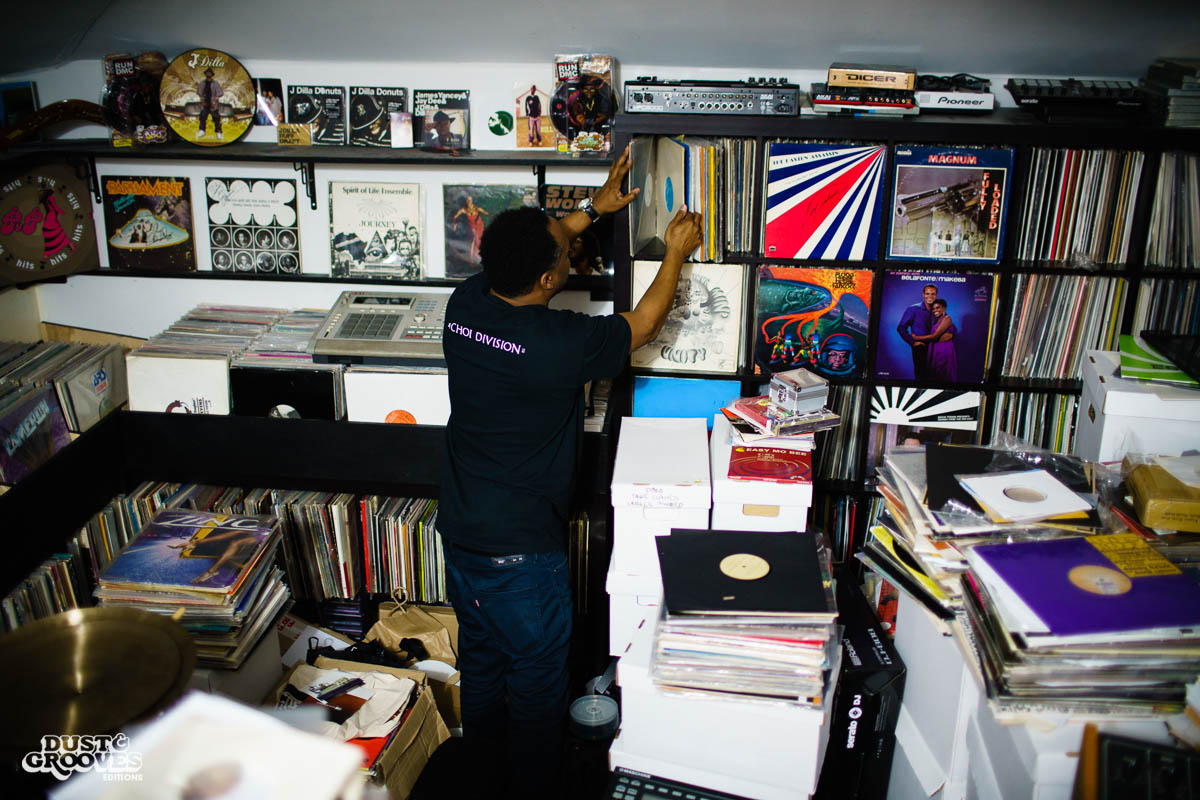


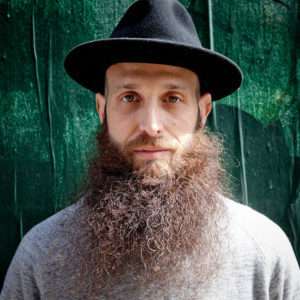
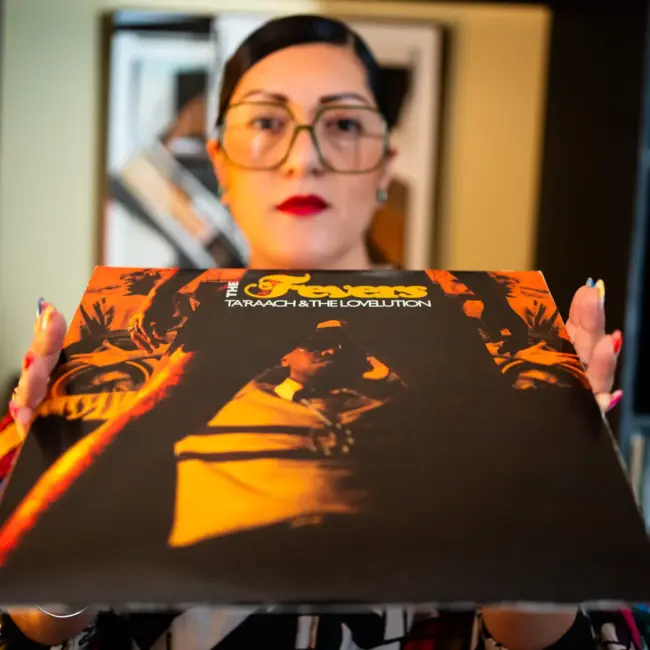

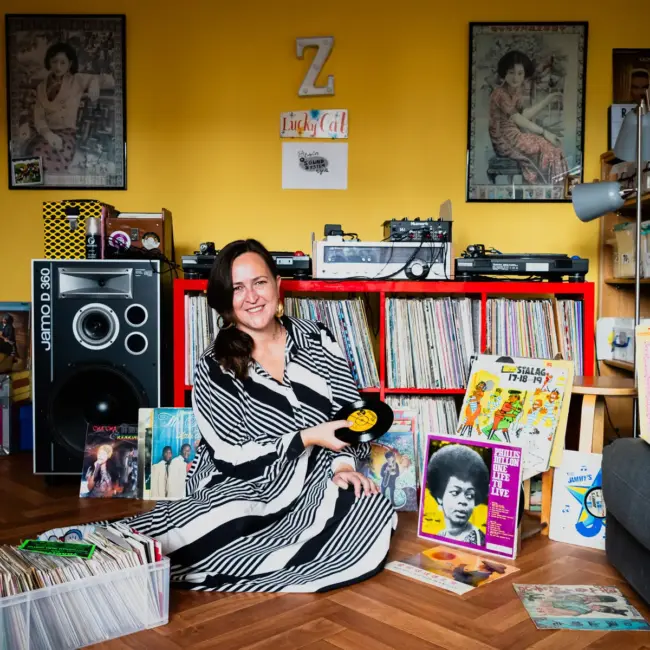
2 Comments
Robert Perlman
Beautiful piece about great DJ and nice guy, salute!
Kristi
Big Jigmastas fan. Love your non-snob approach to collecting and sharing. The only vinyl I own is the Rocky music score by Bill Conti. I've had it since 1st grade. I grew up listening to my dads 45s. Motown, jazz, doowop. In a town of 700 people in the 80s 90s it was hard to hear new things. But I sought it out on vacations and school feild trips. Kids were buying candy and I was buying tapes. I try to pass that love down to my kids now. They tell me every conversation we have I turn into a song. My collection is in my head. And the list is long. I see yours is longer...and its inspiring. Thanks for staying with it and being so transparent and cool.